Is Portugal a Good Place to Retire?
Portugal is one of the best places in the world to retire, according to the International Living’s Annual Global Retirement Index and Forbes. With a low cost of living and tax incentives, retirees come from all over the world to settle down in Portugal. Retirees can make use of the NHR regime, a quality healthcare system, and an all-around high standard of living. Portugal is also one of the safest countries in the EU, according to the Global Peace Index.
While in countries like the US and UK, life is fast-paced and at times stressful, Portuguese life allows retirees to put their feet up and enjoy every day without worry. With over 300 days of sun, can enjoy the climate in Portugal, offering warm summers and moderate winters.
Rich in cultural heritage, Portugal has some of the most iconic architecture, art, and music in Europe. You’ll also find that the country has high-quality cuisine that features Portuguese dishes such as seafood and meat dishes at affordable prices. In fact, all aspects of everyday life are affordable in Portugal, from rent to the price of groceries.
The country has a mix of cosmopolitan cities and isolated towns with stunning nature views, perfect for those who want a little bit of everything. From the vibrant culture in Lisbon to the slow-paced life in Algarve, retirees of every lifestyle will find their home in Portugal.
How to Retire in Portugal: Retirement Visa Requirements
EU/EEA/Swiss citizens can retire to Portugal without needing to apply for a visa. All they need to do is register their stay with the Portuguese authorities. However, others must go through the bureaucratic process to reside and retire in Portugal. The two visas that non-EU/EEA/Swiss internationals can apply to so that they can retire in Portugal are the Portugal Golden Visa and the Portugal D7 Visa.
Portugal Golden Visa for Retirement
If you are not an EU citizen, the Portugal Golden Visa is a way to be able to retire in Portugal. Created in 2012, the Portugal Golden Visa allows non-EU citizens to qualify for a residency permit and eventually a passport in the country through investments. With a Portugal Golden Visa, you can live in Portugal and travel within most European countries without an issue. You are eligible for a Portugal Golden visa if you are a non-EU/EEA/Swiss national. You need to be at least 18 years old and have no criminal record.
The most important part is to engage in an investment. There are five types of investments you can make to qualify for a Portugal Golden Visa: a real estate acquisition, an investment fund, a capital transfer, job creation, or making a donation. An investment will cost you at least between €350,000 and €500,000. Not only will this visa allow you to retire in Portugal, but the Golden Visa also comes with tax incentives and allows you to travel around the Schengen area without any restrictions. The visa also offers family reunification, meaning your family members get all the same rights as you.
Guide to Portugal Golden Visa
You can take a look at our Portugal Golden Visa guide that goes through each investment and all the details you need to know. Wondering how the process of applying to a Golden Visa works?
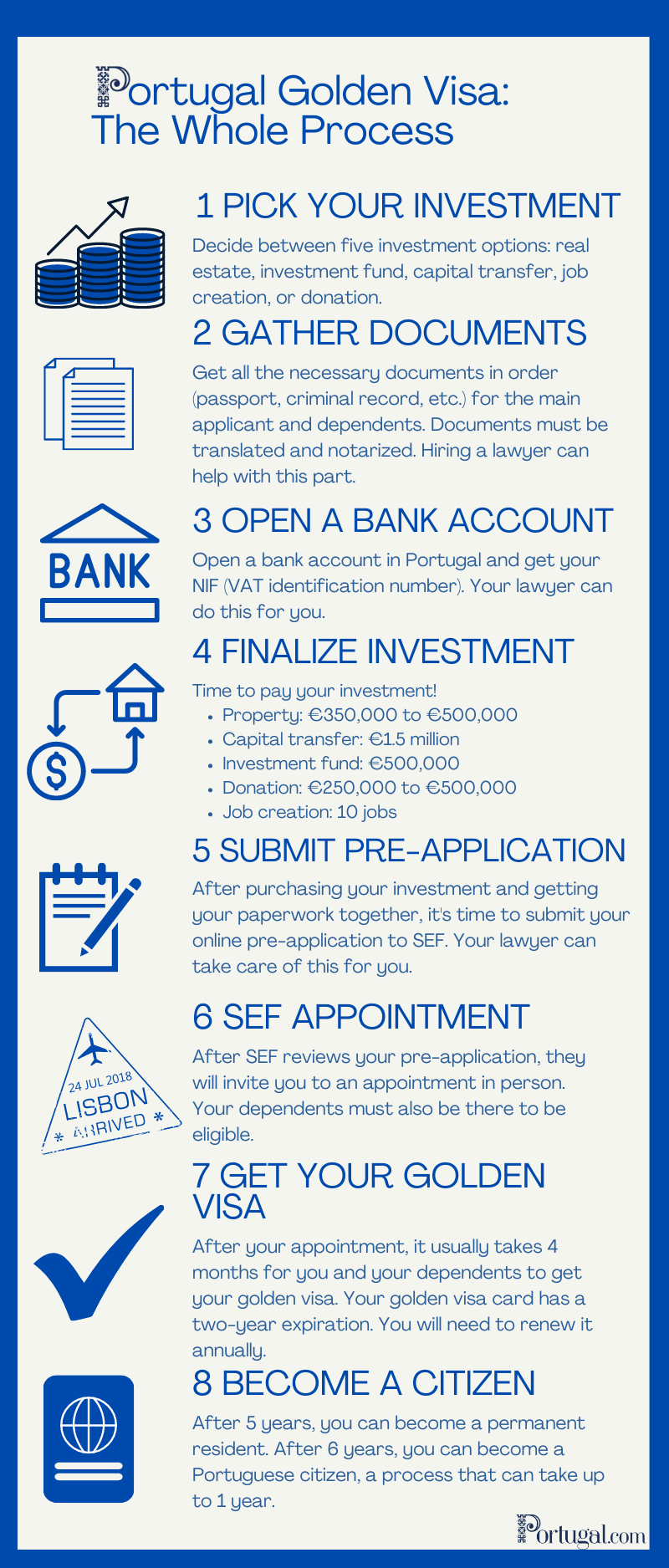
Portugal D7 Visa for Retirement
The D7 Visa was introduced in 2007 and is also known as the Retirement Visa or Passive Income Visa. This visa is for non-EU/EEA/Swiss citizens who want residence in Portugal and have a reasonable passive income. This income can be from a retirement pension, as well as a financial investment, real estate, and more. The minimum passive income required is €8,460 per year for the main applicant. For a spouse, you must add 50% to this (€4,230) and for a dependent child, you must add 30% to this (€2,538). Therefore, for a couple with one child, you would need around €15,300 a year to be eligible for the D7 Visa.
Beyond being able to reside and retire in Portugal, there are many benefits to the D7 Visa. You will be able to travel through Schengen Zone without a visa, access the health care system in Portugal, as well as put your kids in a public school. Moreover, the D7 Visa is a path to citizenship. Once you get your visa, you will have residence for a year. You can renew this every 2 years, and after 5 years, you may apply for permanent residency. If you pass a Portuguese language test, you can then also become a citizen.
The requirements to be eligible for a D7 Visa in Portugal are pretty straightforward. Here are the main eligibility criteria for the Portugal D7 Visa.
- Non-EU/EEA/Swiss citizen
- Minimum passive income of €8,460 per year (+ 50% for spouse and + 30% for dependent child)
- Clean criminal record
- Proof of residence address in Portugal (rental or purchase)
- You need to spend at least 16 months in Portugal during the first 2 years.
Guide to Portugal D7 Visa
Let’s go through the step-by-step process of applying for a D7 Visa.

Frequently Asked Questions About Visa Requirements for Retiring in Portugal
Can I retire to Portugal as an EU citizen?
If you are an EU citizen, as well as an EEA or Swiss citizen you can retire in Portugal without a visa. However, you will have to get a Registration Certificate from the Portuguese authorities. After residing in Portugal for five years, you can apply for long-term residency with SEF. You will need to renew this every 10 years. You can also apply for Portuguese citizenship after living in Portugal for six years.
Can I retire to Portugal as a US citizen?
There are plenty of American retirees in Portugal so yes, you can retire to Portugal as an American citizen. As a non-EU/EEA/Swiss citizen, you will have o apply for either a Portugal D7 Visa or a Portugal Golden Visa. The most affordable visa is a Portugal D7 Visa where you only need a minimum passive income of €8,460 per year (+ 50% for spouse and + 30% for dependent child). For a Portugal Golden Visa, you need to make an investment of at least between €350,000 and €500,000. Take a look at our full guide for the Portugal Golden Visa here. These visas also allow you to get permanent residence after 5 years and eventually become a Portuguese citizen after 6 years once you pass a Portuguese language test.
Can I retire to Portugal as a UK citizen after Brexit?
UK citizens can retire to Portugal, even after Brexit, by applying for a Portugal Golden Visa or a Portugal D7 Visa, similarly to Americans. In fact, all non-EU/EEA/Swiss citizens can do so. The most affordable visa is a Portugal D7 Visa where you only need a minimum passive income of €8,460 per year (+ 50% for spouse and + 30% for dependent child). For a Portugal Golden Visa, you need to make an investment of at least between €350,000 and €500,000. Take a look at our full guide for the Portugal Golden Visa here. These visas also allow you to get permanent residence after 5 years and eventually become a Portuguese citizen after 6 years once you pass a Portuguese language test.
Retiring in Portugal: Taxes under the Non-Habitual Tax Regime
If you have a Golden Visa, a D7 Visa or are an EU/EEA/Swiss citizen, you can retire in Portugal and follow the non-Habitual Resident (NHR) tax regime where you transfer your tax residency to the country.
Guide to NHR Tax Regime
Here are the benefits of this tax regime:
- Your pension income is taxed at a flat rate of 10%, including retirement savings and life insurance.
- Income from “high value-added activities” in Portugal is taxed at 20%. This includes employment and self-employment income from activities of scientific, artistic, or technical character performed in Portugal. Still, you will pay the same income tax as ordinary tax residents for other types of domestic income.
- You will only be taxed on your worldwide income after the first 10 years of residence.
- Foreign interest, dividends, rents, and property capital gains can be exempted from taxation. You will also not pay an inheritance or wealth tax.
Here are the conditions to follow the non-habitual residency program:
- You cannot have been taxed in Portugal during the five years before the application.
- You must request a tax residence certificate which means you must live in Portugal for more than 183 days (doesn’t need to be consecutive) for 12 months, lived in Portugal for less than 183 days, but has bought property during those 12 months, or performs public functions in the name of the Portuguese state.
- You must have the right to be in Portugal through a work visa, Portugal Golden Visa or by being an EU/EEA/Swiss citizen.

Does Portugal Tax Retirement Pensions?
Under the non-Habitual Residence tax regime, your pension income might be taxed at a flat rate of 10%, including retirement savings and life insurance. This applies if your pension comes outside of Portugal. However, if your pension comes from a country that has a Double Taxation Agreement (DTA) with Portugal, your pension is fully exempt from the income tax rate (IRS). Therefore, the collection of your taxes on your pension income would fall to the country where your pension comes from.
The following countries have a DTA with Portugal: Algeria, Austria, Andorra, Bahrain, Barbados, Brazil, Bulgaria, Canada, Cape Verde, Chile, China, Colombia, Croatia, Cuba, Cyprus, Czech Republic, Denmark, East-Timor, Estonia, Ethiopia, Finland, France, Germany, Georgia, Greece, Guinea-Bissau, Hong Kong, Hungary, Iceland, India, Indonesia, Ireland, Israel, Italy, Ivory Coast, Japan, Kuwait, Latvia, Lithuania, Luxembourg, Macau, Malta, Mexico, Moldova, Montenegro, Morocco, Mozambique, Netherlands, Norway, Oman, Pakistan, Panama, Peru, Poland, Romania, Russia, San Marino, São Tomé and Principe, Saudia Arabia, Senegal, Singapore, Slovakia, Slovenia, South Africa, South Korea, Spain, Qatar, Sweden, Switzerland, Tunisia, Turkey, United Arab Emirates, United States of America, United Kingdom, Ukraine, Uruguay, Venezuela, and Vietnam.
6 Best Places to Retire in Portugal
1. Algarve
The Algarve was selected as the #1 place in the world to retire by Forbes. This region is located on Portugal’s south-western tip and is surrounded by the Atlantic ocean from two sides. The Algarve has the best weather in the country due to its location in the South, as well as some of the best beaches in the country. The cities of Tavira, Faro, and Lagos are some of our top favorites for retiring, each highlighting a unique area of the Algarve, while all having stunning long stretches of golden sandy beaches. The Algarve has a huge retiree community, with people from all over the globe. During most of the year, the Algarve has a slow-paced environment without overpopulation. However, the Algarve does get quite busy in July and August, as the Portuguese travel South for vacation, as well as international tourists. Take a look at our guide to Algarve here.
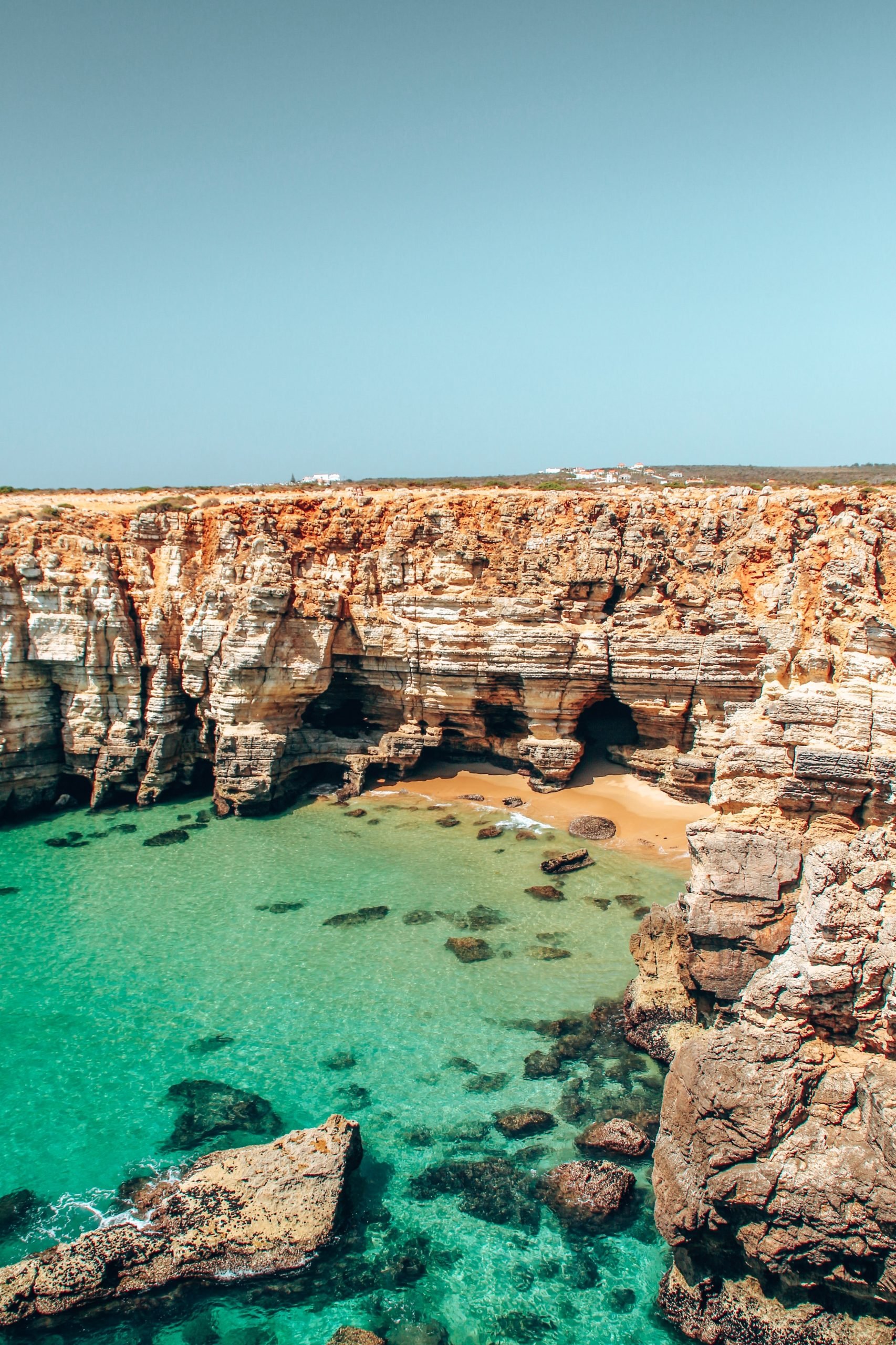
2. Alentejo
On the way to Algarve from Lisbon, the region of Alentejo is where many spend their summers. From gorgeous beaches, golden plains, and rolling hills, this region provides locals with both the farm life experience and beach vacation. The Alentejo is known for its production of regional tapestries, leather, cork, as well as of local wine, making it one of Portugal’s top wine destinations. A great place to retire in Alentejo is the city of Evora. This small city might not be an expat hotspot, but it is the perfect place for a countryside life that is affordable. Evora has an incredible cultural heritage, with its historical center being classified as a UNESCO World Heritage Site and the presence of 400 historical buildings in the city. The typical Portuguese sidewalk (“Calçada Portuguesa”) fills the narrow streets of Evora and makes it a beautiful city to live in. If you prefer the beach life to the country life, we recommend Zambujeira do Mar or Vila Nova de Milfontes. Take a look at our guide to Alentejo here.

3. The Azores
Between Lisbon and New York lies an archipelago called the Azores, made up of 9 islands. The Azores are a part of Portugal and are located 850 miles west of what the Portuguese call the “mainland”. Millions from all around the globe travel to the Azores every year to discover the beautiful landscapes and unique cultural heritage of each island. However, the Azores is also the perfect place to retire if you are looking to live surrounded by nature. The Azores is a top place for American retirees in particular, as the archipelago is actually the birthplace of many Americans. About a million North Americans were born or descend from the Azores, four times the current population of the islands! Our favorite islands in the Azores are Pico, Flores, and Faial, as well as São Miguel for a more cosmopolitan island. Take a look at our guide to the Azores here.
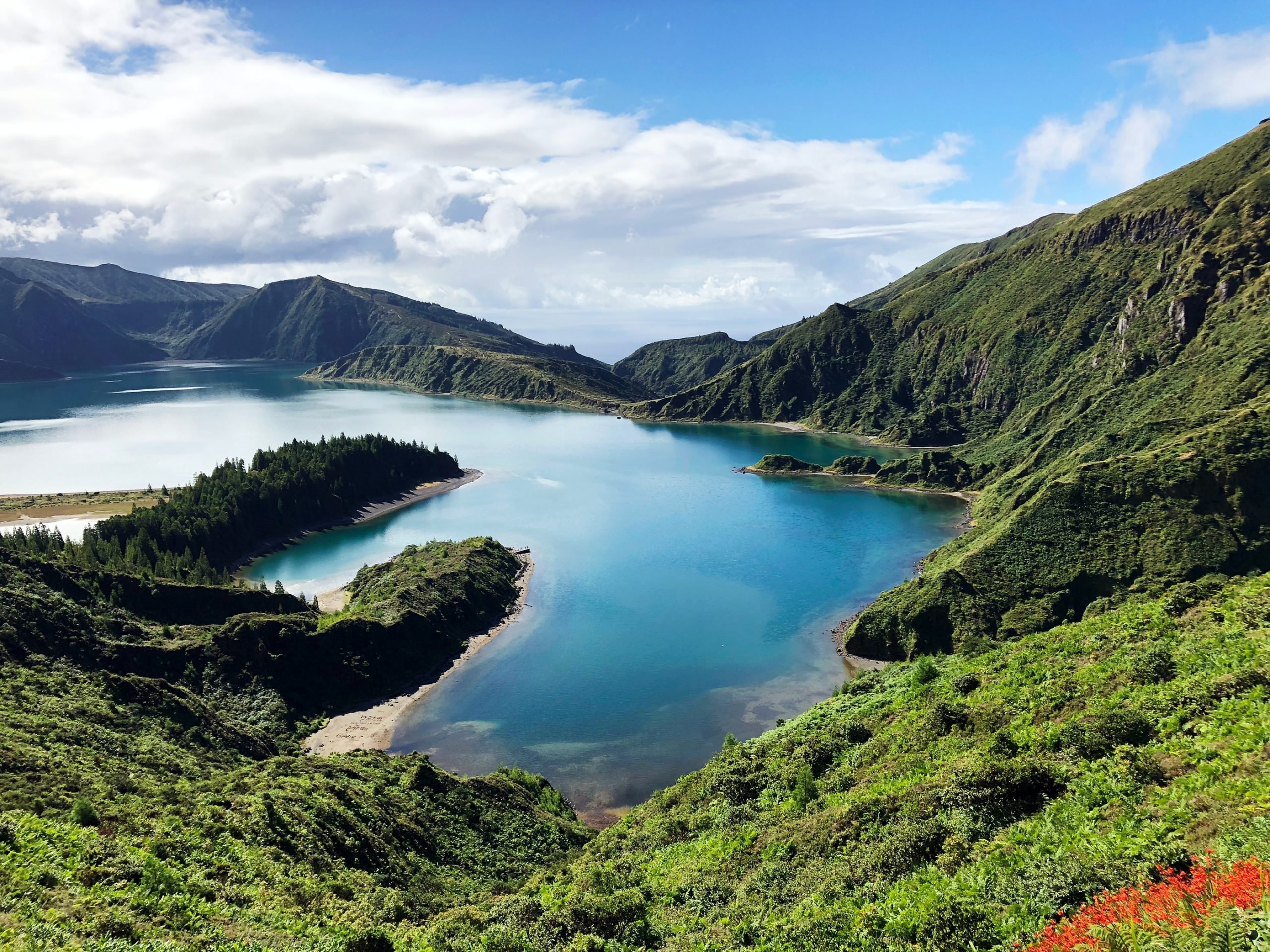
4. Madeira
Madeira is an autonomous region of Portugal, an archipelago in the North Atlantic Ocean, 400 kilometers to the north of the Canary Islands. The archipelago includes the islands of Madeira, Porto Santo, and the Desertas. Around 250,000 people live on the island and the capital is Funchal, one of the best cities for retiring in Madeira. The retirement community in Madeira is quite large, with expats coming from all over the world, but mostly from the US and UK. Madeirenses enjoy some of the best weather in Portugal as it is located in the African Plate, making Madeira the perfect place to retire for a slow-paced island life. Madeira is also a great place to purchase a house in terms of pricing. Take a look at our guide to Madeira here.
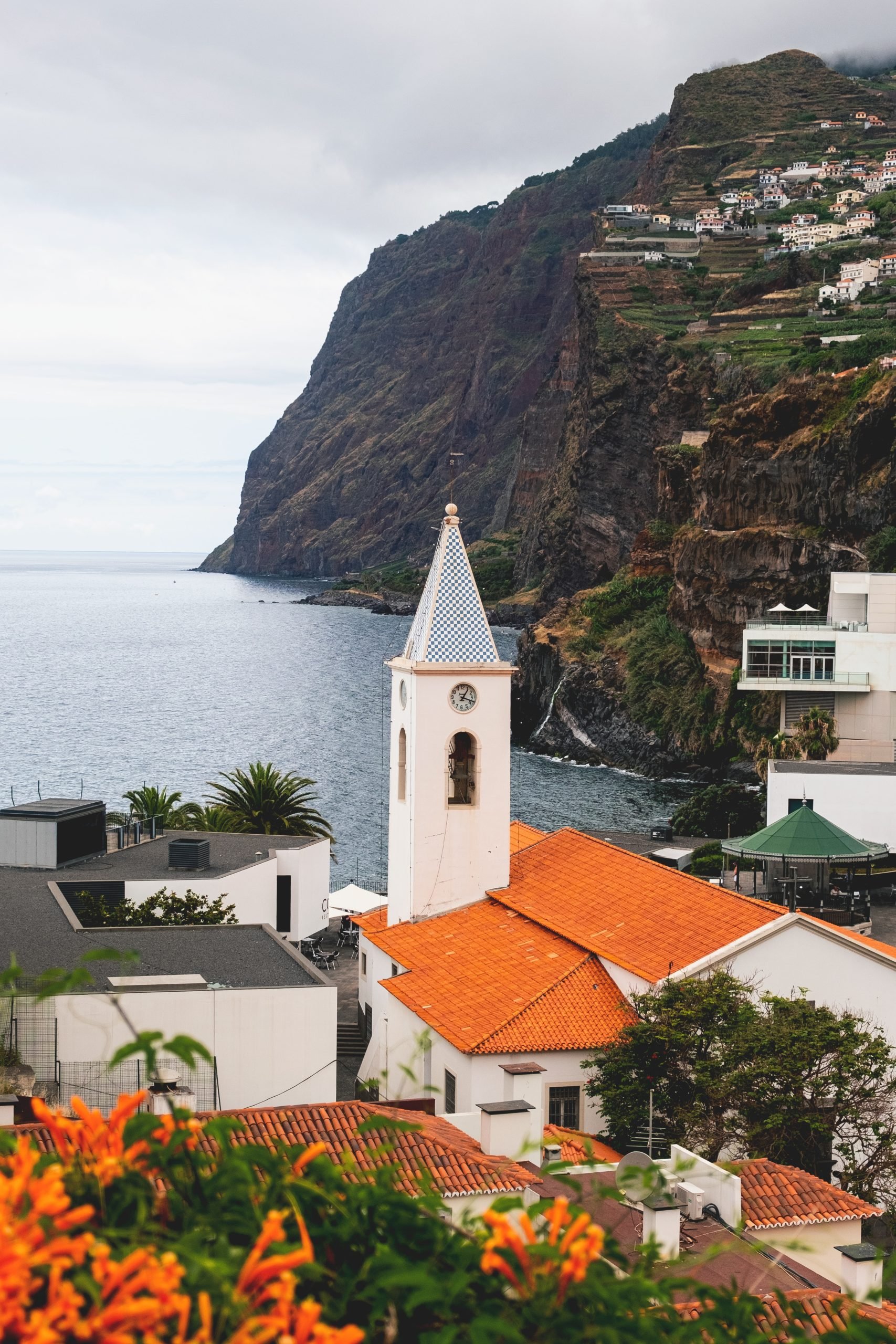
5. Lisbon
Lisbon, the capital, is the city with the most expats in Portugal. Although it’s not a retirement hotspot like the Algarve, not everyone wants to retire in a small town, surrounded by nature. If you are looking to retire in a major city, while still being close to nature such as quality beaches and mountain trails, Lisbon is a great option. The birthplace of Amália Rodrigues, the iconic Fado singer, Lisbon is rich in culture, history, and striking views. The city has heavily invested in public infrastructure and has quality schools, transportation, and hospitals. The capital has a thriving nightlife scene, with affordable bars and clubs. Lisbon is also only 20 minutes away from beaches, and 30 minutes away from the picturesque towns of Cascais and Sintra.
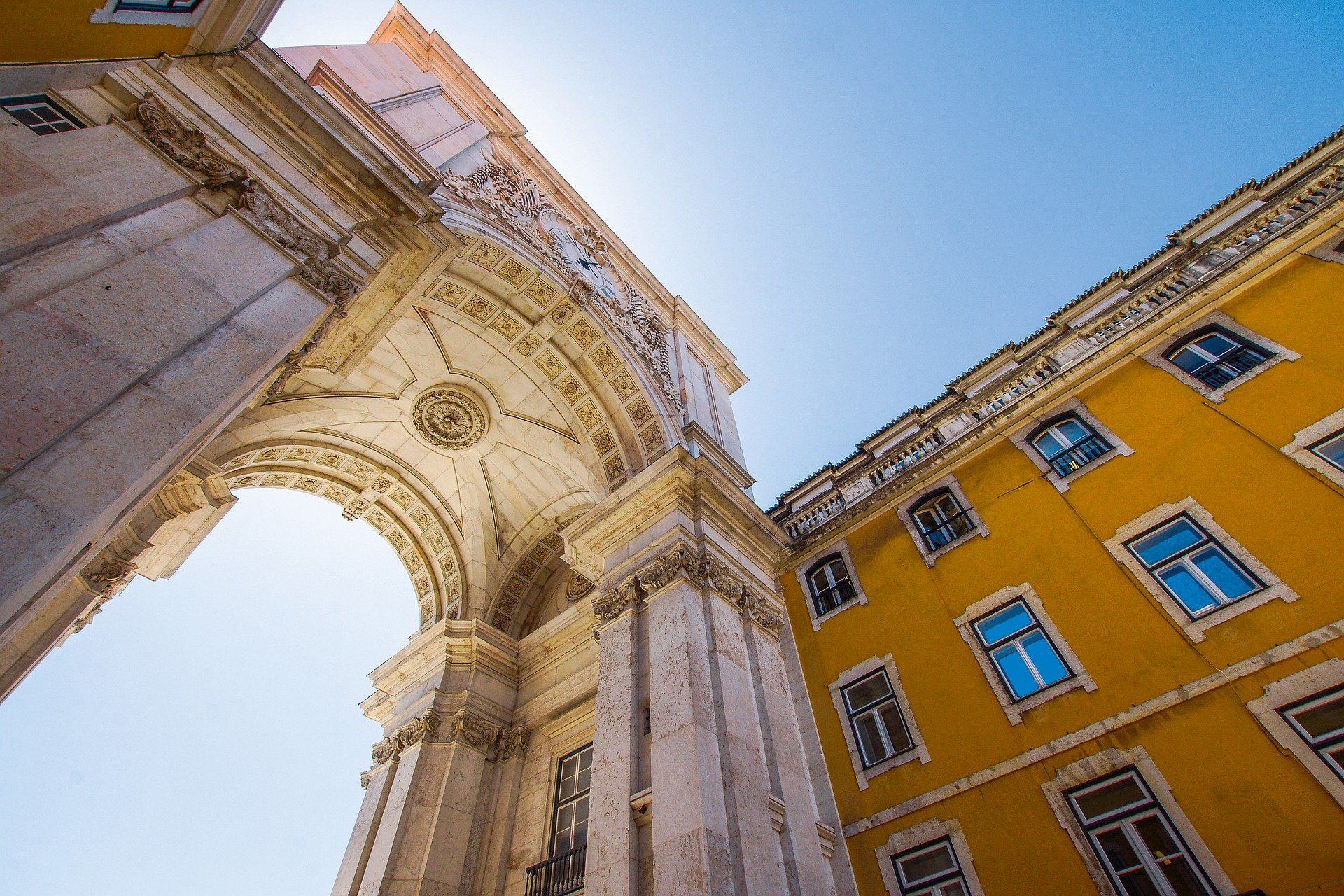
6. Porto
Porto is the second-largest city in the country after Lisbon, 280 kilometers north of the capital. Porto’s beauty is in the fact that the cosmopolitan city lies along the Douro river. The city is home to the best wine in the country, street art and gorgeous architecture. Porto is one of the world’s top 100 cities with the most international visitors and over 1 million tourists visit Porto every year. If you are looking to retire in a cosmopolitan city that is less populated than Lisbon, Porto could be your next home. You will also be close to the Douro Valley, a landscape of vineyards that has been classified as a World Heritage Site by UNESCO, as well as the beautiful Peneda-Gerês National Park, the only national park in Portugal. The beach in Matosinhos is also just a 20-minute drive away.
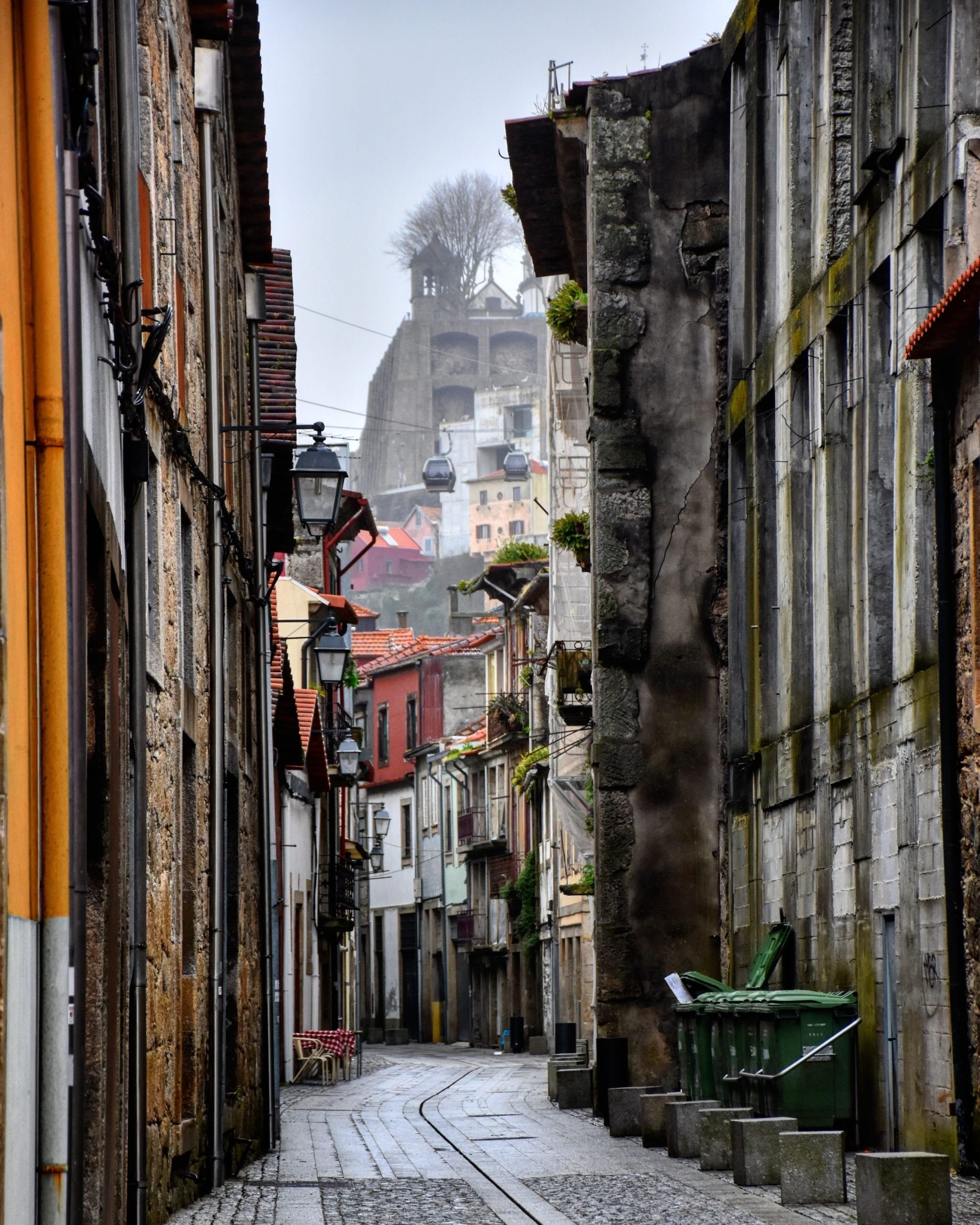
Cost of Living in Portugal: Is it Expensive to Retire in Portugal?
Retiring in Portugal is not expensive as it has one of the lowest costs of living in Western Europe. In fact, moving to Portugal to retire is one of the most affordable options, rather than moving for work as the average annual salary is under €20,000. With a low tax on retirement pensions and various tax incentives, a low cost of living comes as an added bonus. You’ll spend around €1,300 – €1,750 a month in smaller towns and around €1,750 – €1,925 in larger cities. Let’s go through the average cost of living in the two most populated cities, Lisbon and Porto, as well as the common regions for retirement of Alentejo and Algarve. The islands of the Azores and Madeira are also a great place to retire.
Cost of Living in Lisbon, Portugal
According to Numbeo, the estimated monthly costs for a family of four in Lisbon are €2,024.31 without rent. A single person’s estimated monthly costs are €579.70 without rent.
- Three-course meal for 2 people at mid-range restaurant €35
- McMeal at Mcdonalds €7
- Domestic Beer (0.5 liter draught) €2
- Water €1.12
- Marlboro cigarettes (20) €5
- Monthly transportation pass €40
- Gym membership €35
- International primary school €8,995.47 yearly (anywhere from €5,000 to €15,000)
- Rent for 1 bedroom in city center €865.95
- Rent for 3 bedrooms in city center €1,091.41
- Buying a house, price per square meter in city center €4,728.21
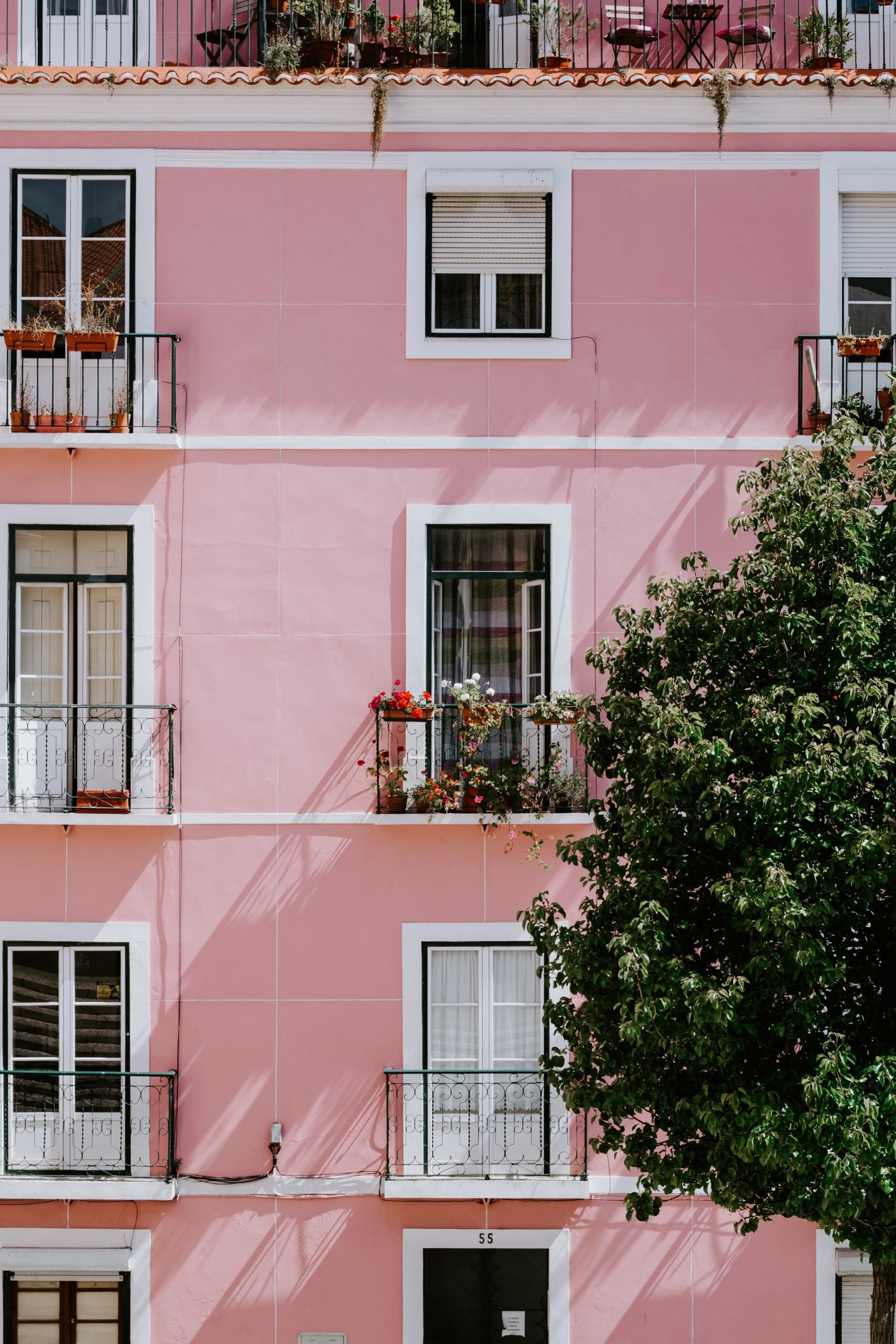
Cost of Living in Porto, Portugal
According to Numbeo, the estimated monthly costs for a family of four are €1,938.31 without rent. A single person’s estimated monthly costs are €552.88 without rent.
- Three-course meal for 2 people at mid-range restaurant €34
- McMeal at Mcdonalds €6.50
- Domestic Beer (0.5 liter draught) €2
- Water €0.90
- Marlboro cigarettes (20) €5
- Monthly transportation pass €30
- Gym membership €30
- International primary school €6,277.57 yearly (anywhere from €4,200 to €7,500)
- Rent for 1 bedroom in city center €670.59
- Rent for 3 bedrooms in city center €1,184.06
- Buying a house, price per square meter in city center €2,935.25
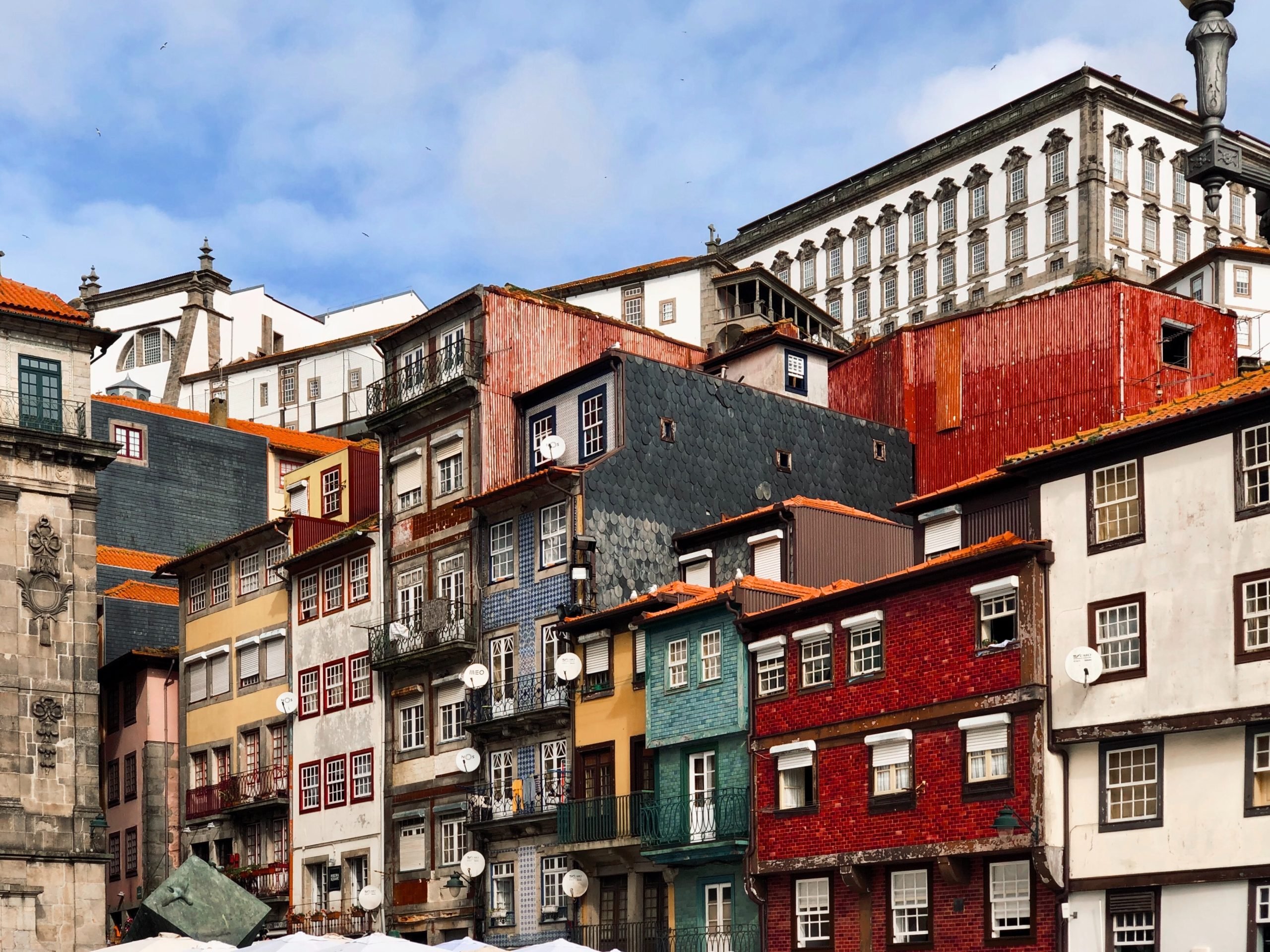
Cost of Living in Evora, Alentejo
Rent in Evora is around 45% cheaper than in Lisbon, according to Numbeo.
- Three-course meal for 2 people at mid-range restaurant €28
- McMeal at Mcdonalds €7
- Domestic Beer (0.5 liter draught) €1.50
- Water €1.15
- Marlboro cigarettes (20) €5
- Monthly transportation pass €22.50
- Gym membership €48
- International primary school €4,000 yearly (anywhere from €2,400 to €5,600)
- Rent for 1 bedroom in city center €450
- Rent for 3 bedrooms in city center €783.33
- Buying a house, price per square meter in city center €966.67
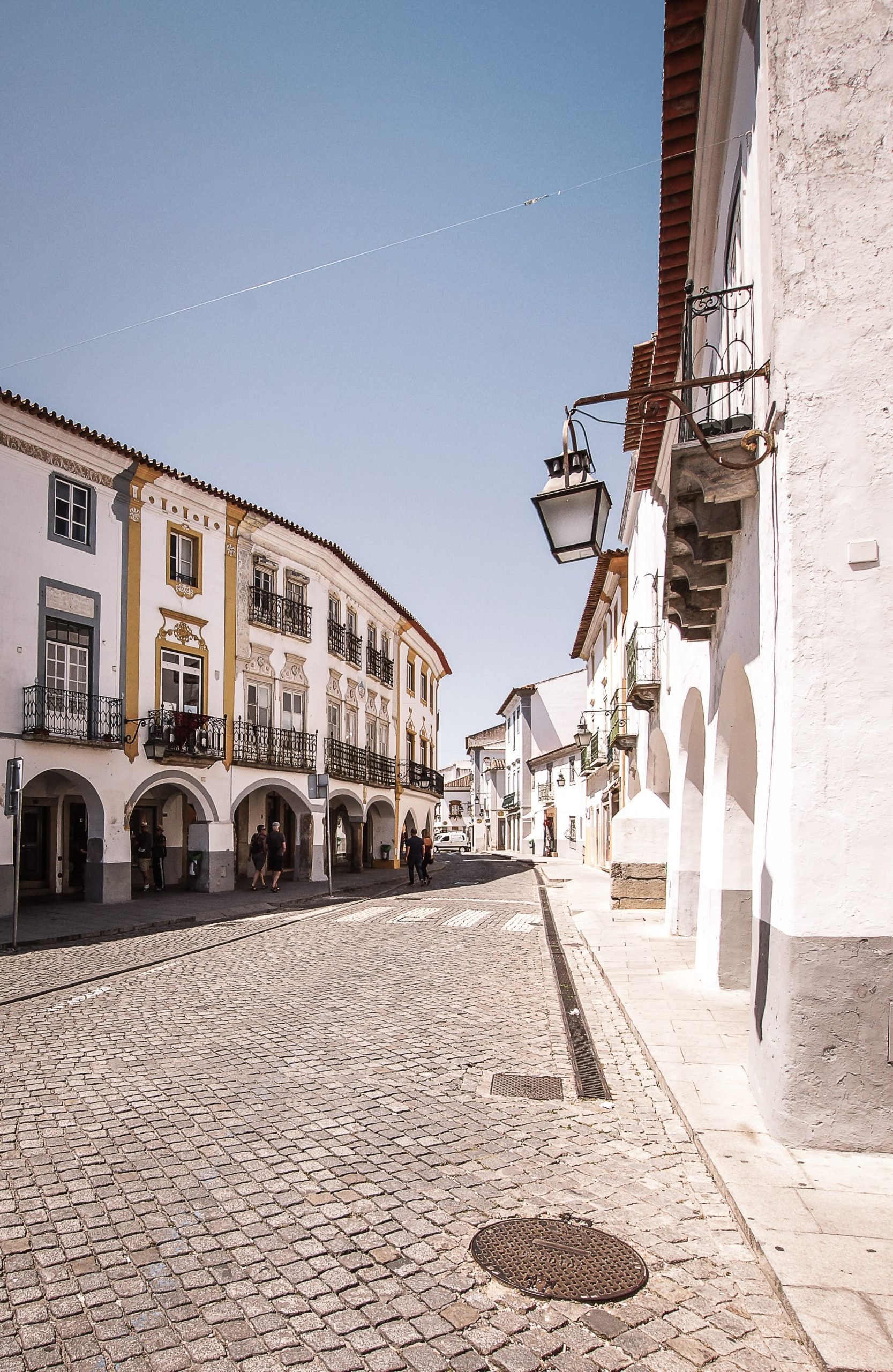
Cost of Living in Tavira, Algarve
According to Numbeo:
- Three-course meal for 2 people at mid-range restaurant €30
- McMeal at Mcdonalds €5.50
- Domestic Beer (0.5 liter draught) €2.70
- Water €0.95
- Marlboro cigarettes (20) €4.75
- Gym membership €35
- Preschool €400 monthly (International primary schools not available)
- Rent for 1 bedroom in city center €615.17
- Rent for 3 bedrooms in city center €800
- Buying a house, price per square meter in city center €2,000
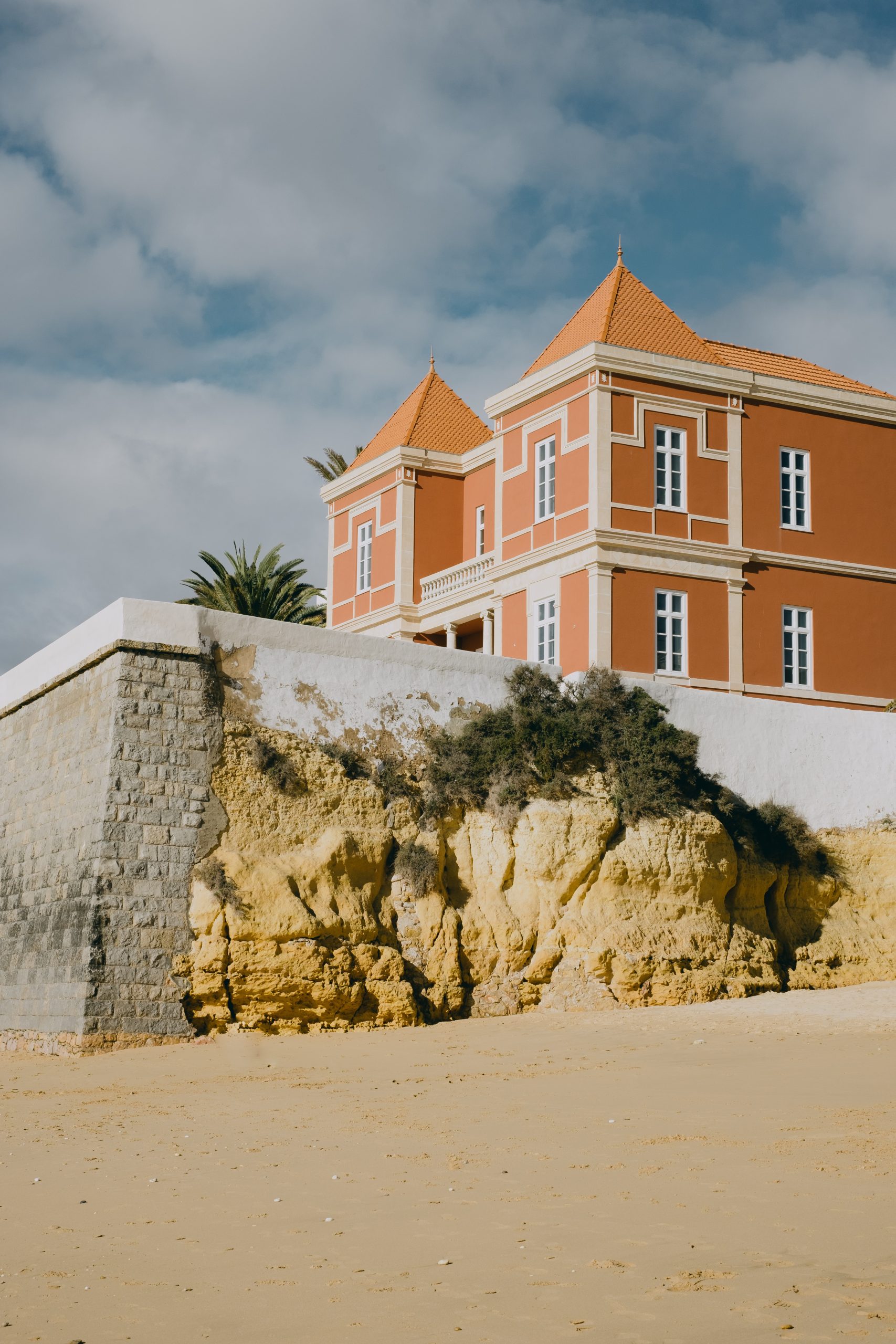
Cost of Living in Ponta Delgada, the Azores
According to Numbeo:
- Three-course meal for 2 people at mid-range restaurant €30
- McMeal at Mcdonalds €6.75
- Domestic Beer (0.5 liter draught) €1
- Water €0.55
- Marlboro cigarettes (20) €4
- Monthly transportation pass €39
- Gym membership €33.75
- Preschool €300 monthly (International primary schools not available)
- Rent for 1 bedroom in city center €491.67
- Rent for 3 bedrooms in city center €800
- Buying a house, price per square meter in city center €2,637.16

Cost of Living in Funchal, Madeira
Funchal is around 5% cheaper than Lisbon and rent is around 35% cheaper. According to Numbeo, the estimated monthly costs for a family of four are €1,886.40 without rent. A single person’s estimated monthly costs are €529.0 without rent.
- Three-course meal for 2 people at mid-range restaurant €32
- McMeal at Mcdonalds €6
- Domestic Beer (0.5 liter draught) €2.50
- Water €1.08
- Marlboro cigarettes (20) €5
- Monthly transportation pass €35
- Gym membership €40
- International primary school €6,000 yearly (anywhere from €2,400 to €13,000)
- Rent for 1 bedroom in city center €617.86
- Rent for 3 bedrooms in city center €1,066.67
- Buying a house, price per square meter in city center €2,125
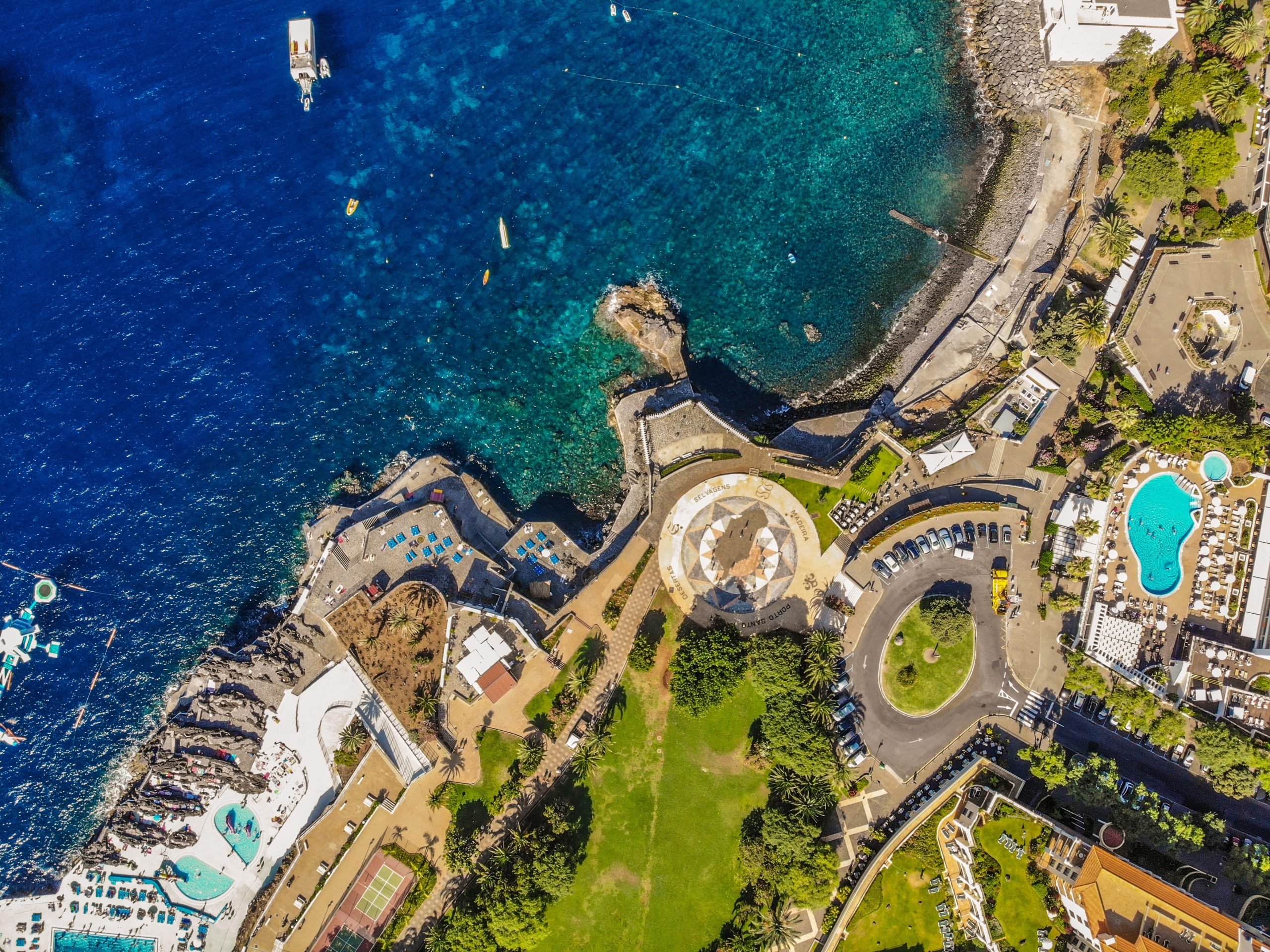
Is it Cheaper to Retire in Portugal or Spain?
According to Numbeo, the cost of living in the Portuguese capital of Lisbon is cheaper than in the Spanish capital Madrid. You would need around €3,060 in Lisbon to have the same standard of life that you can have with €3,400 in Madrid (with rent). A 3-bedroom apartment outside the city center costs €1,109 in Madrid and €1,087 in Lisbon. Restaurant and grocery prices in Lisbon are around 20% lower than in Madrid.



Sounds like a nice place to live